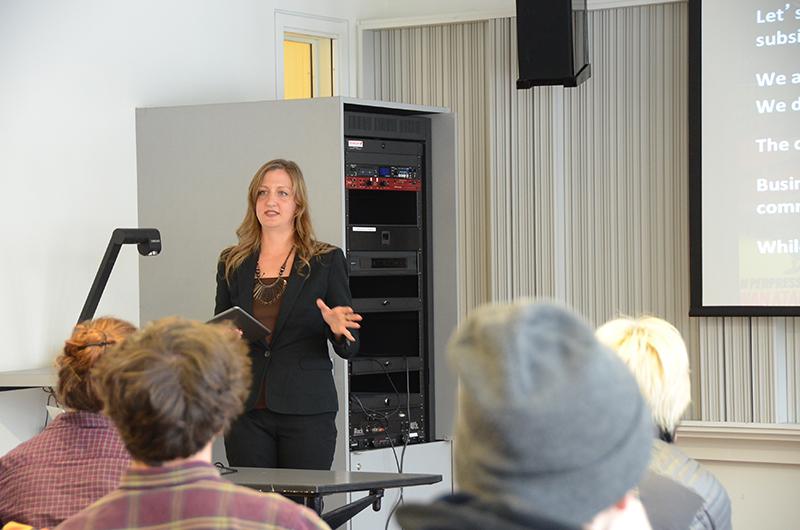Talk Underscores Intersection of Political Activism, World Music
February 20, 2015
Aviva Blonder
Staff Writer
Rebekah Moore was still getting used to speaking in English again at her talk this past Monday, “Music and Activism and Ethnomusicology in Action: Lessons from the Field.” At the talk, Moore discussed her work in Indonesia over the past six years and delineated connections between music and activism. “[Music] can help us to understand a lot about what it is to be human,” she said.
Moore first visited Indonesia while completing her master’s degree. “I was playing gamelan, which is an [instrument] that you find all over Indonesia. … I spent some time in Bali and got my first taste of some of the local bands from a cassette shop,” she said. Her talk did not primarily focus on gamelan, but instead on modern Indonesian bands. Throughout the talk Moore played clips of songs, including “Bento” by the ’70s performer Iwan Fals, whom she described as the “Bob Dylan of Indonesia.” Iwan Fals protested the Suharto government, who in turn arrested him, jailed him and banned him from performing for several years upon his release. Indonesia is now a democracy, but modern Indonesian musicians are still politically active.
For example, the rock band Navicula is known for its involvement in environmental activism. According to Moore, the lead singer is highly educated and has helped the government with disaster relief and preparedness. Moore joined Navicula on a tour through inner Kalimantan, the Indonesian portion of the island of Borneo, where they worked with Greenpeace to document and raise awareness of illegal deforestation. During the talk on Monday, Moore showed a video of Navicula driving through a village on motorcycles, drawing attention to its cause.
Moore has organized concerts in Indonesia, using the clout of famous musicians to draw public attention to the HIV and AIDS epidemic and open up a national dialogue on what is typically considered a taboo topic. She has encouraged collaboration between bands from different genres to, as she described it, “use music to take on issues” and cultivate a “healthy musical ecology.” Moore showed one video clip of a collaboration between a gamelan orchestra and an electronica band.
The usage of music and ethnomusicology for activist purposes isn’t limited to Indonesia. As Moore said, “When we’re looking at a country with a very short history of direct elections for their president, there tend to be some central issues that are a bit more obvious, some central social injustices that stick out more, but that doesn’t mean we don’t have a lot going on in the United States that musicians are dealing with.”
Moore organized her talk with ethnomusicologist Jennifer Fraser, who teaches classes on the music of Indonesia and the intersection between music and activism in the Conservatory. “Ethnomusicology is well positioned to address issues of racial and social injustice. I’ve taught a class on music ecology, where we look at environmental destruction and justice issues. … I made space in the class to talk about Ferguson, and we’ve talked about music and ebola, music and the Hong Kong protests and so on,” said Fraser. She further explained, “I am getting ready to put together a class on musical activism, so I thought it would be nice to feed into that on campus.” Though the class is still in the early planning stages, Fraser said that “it would be a class that involved community engagement and not just the theory of musical activism.”
One of the students who attended the talk on Monday, Conservatory junior Jeanette Chen, stayed after the talk to speak with Rebekah Moore. “I’m trying to explore the field of musical activism, how the arts can play a role in conflict resolution. I think it’s really interesting how art can play a very healing role in places of violence and conflict,” said Chen. She explained that the talk gave her hope that music can play a role in places of conflict. She described it as a very human way of connecting communities.
















